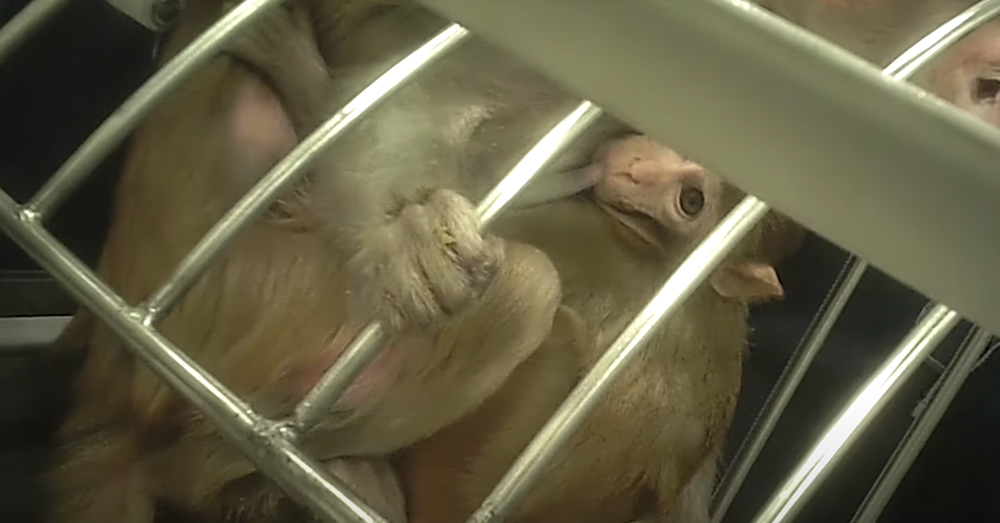
Monkeys At Wisconsin Facility Ripped From Their Mothers, Tortured And Discarded Like Trash
Nearly 2,000 monkeys are being held captive at the Wisconsin National Primate Research Center (WNPRC). They are locked in steel cages, in windowless rooms, Not only fo they deal with the stress of an isolated existence, they are being put through torturous experiments.
And when they die, they are discarded like trash.
An undercover investigation led by PETA, carried out at the WNPRC over the course of six months, revealed the disturbing treatment these primates have been subject to for more than 20 years.
According to PETA’s release, “‘One worker said that some monkeys can’t be housed with others ‘because they are a**holes’ to one another in the highly stressful, grim, substandard conditions—leading them to sustain deep, painful lacerations; such severe damage to fingers that they require amputation; and other injuries from attacks. Other monkeys mutilated themselves or paced and circled endlessly, a well-recognized way of trying to cope with mental anguish. Some of them pulled out their own hair, ending up nearly bald. Many were found to have chronic diarrhea lasting for months or even years. Cornelius, a monkey who has been at WNPRC for a decade and is usually kept in isolation, was consistently found hunched over or with his face pressed against the cage bars. As one supervisor said, staff are “not supposed to say” that monkeys ‘look depressed … but sometimes they just do.'”

Baby rhesus monkeys in this program are taken from their mothers shortly after they are born.
The caged macaques are forcibly bred. Almost as soon as the babies are born they are taken from their mothers just as forcibly. Wailing in terror, the newborns are tattooed with an identification code. And when they are old enough to meet the testing criteria, they are shackled by the neck and electrocuted in the genitals.
Video footage and photographs from the investigation are deeply unsettling, but an important piece of evidence in the case against the WNPRC’s continued testing on these highly intelligent animals.
The USDA previously fined the University of Wisconsin–Madison, under which the facility is hosted, multiple times for denying animals basic care.
According to the Wisconsin State Journal, “UW-Madison was fined $74,000 in April by the USDA for 28 violations of federal animal research treatment standards from March 2015 to April 2019. In August, the group Stop Animal Exploitation NOW!, or SAEN, filed a complaint with the USDA claiming four additional incidents reported by the university in October through February were federal violations.”

The monkeys are tattooed with an ID code.
One of the facility’s most controversial programs was approved by the graduate school’s Institutional Animal Care and Use Committee (IACUC) in 2014. At the time, Wisconsin Watch described it as “the first experiment at UW-Madison in more than 30 years that will intentionally deprive newborn monkeys of their mothers, a practice designed to impact a primate’s psychological well-being.”
In this program, 20 rhesus monkeys were put through tests designed to provoke anxiety, while researchers measured their level of discomfort and compared the findings to another group of 20 monkeys used as a control group. A year later the monkeys were euthanized. Their brains were removed and dissected.

Maternal deprivation studies are highly controversial, but have been conducted for decades.
“We’re killing baby monkeys,” said UW-Madison bioethicist Rob Streiffer. “There are other things that have been done that are worse, but that’s not a justification for saying that this isn’t really really bad.”
The U.S. Department of Agriculture (USDA) and the National Institutes of Health (NIH), which gave the WNPRC a grant alongside the $300 million in tax dollars it collected in 2019, have now launched their own investigations into the research facility.
“The Wisconsin National Primate Research Center uses the public’s tax dollars to torture monkeys,” wrote Dr. Alka Chandna, PETA’s vice president of laboratory investigations, in a public release. “It has repeatedly failed to abide by the law and must be shut down.”

A 6-month undercover investigation at the Wisconsin National Primate Research Center (WNPRC) revealed unsettling images.
According to Wisconsin Watch, At least 2,000 primates are kept captive in several locations around the UW-Madison campus. About two-thirds of them at the WNPRC, and other at the Harlow Center for Biological Psychology, next door.
UW-Madison’s initial foray into primate studies was led by experimental psychologist Harry Harlow in 1930. By the 1970s, the effects of maternal deprivation studies were seemingly obvious, as primates put through Harlow’s experiments wound up with “permanent psychological damage” for the remainder of their lives.
“It went to an extreme,” Streiffer says. “People look back on that and think, ‘Oh, that was really awful.’ And for decades, people didn’t do it for research purposes. The nursery at (the) Harlow (Center) was shut down. We didn’t want to do that anymore.”

These monkeys will be euthanized and discarded when the program is done.
The WNPRC’s current programs are led by UW-Madison Psychiatry Department chairman Dr. Ned Kalin, who has introduced even more macabre tests to this dark legacy.
“In a Kalin study published in 2004, the amygdalae of 14 rhesus macaques were damaged with acid after their skulls were cut open,” Wisconsin Watch reports. “The amygdala is a region of the brain that regulates fear and anxiety. The monkeys were then exposed to snakes and unknown humans.”

The USDA has cited the WNPRC multiple times for code violations.
A copy of PETA’s complaint to the USDA was sent to UW-Madison associate vice chancellor for research policy and compliance Nadine Connor, who said she did not review it immediately.
“UW–Madison is continuously examining and improving its procedures, equipment and personnel training to maximize the societal benefit of our vital animal research and to minimize risks to animals,” Connor later wrote in a statement.
Click the button below to make a difference.